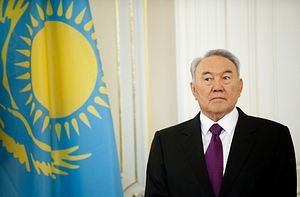Kazakhstan’s ruling party, Nur Otan, looks set to retain its overwhelming majority in the country’s parliamentary elections this weekend. The election, held nine months early, went exactly as expected with the government touting high turnout and Commonwealth of Independent States (CIS) monitors labeling it free even before exit polls, let alone results, were announced. Meanwhile, Western observers questioned the actual plurality of the polls in advance, videos of apparent ballot-box stuffing surfaced (such as this guy casting votes for his whole family), and regional commentators mocked the election–I called them “boring” last week.
What should have been a critical election was, in reality, a piece of theater designed to praise the country’s leader, despite the dark economic times. To drive home that point, this is a video of a rehearsal of some sort filmed by Radio Azattyk, the Kazakh bureau of RFE/RL, a few days ahead of the election showing students entering a stadium in Astana. Just after the 2-minute mark they’re practicing chants: “Nur-sul-tan! Nur Otan! Nur-sul-tan! Nur Otan!”
Sunday’s polls included six parties, fronting 234 candidates for 98 seats. Nur Otan, which means Light Fatherland, is the party of Kazakhstan’s first and only president, Nursultan Nazarbayev, and put forth more than half of the candidates (127).
Exit polls indicate that the new parliament will be made up of the same parties that sat in the previous parliament. Such early indicators list Nur Otan as capturing 82 percent of the vote (higher than its 80 percent in 2012’s election). Ak Zhol and the Communist People’s Party of Kazakhstan (KNPK) are listed in the same exit poll as just barely (as in 2012) passing the 7 percent threshold to earn seats (7.22 percent and 7.17 percent, respectively). The other three parties are scraping the bottom: Auyl (2.05 percent), the Social Democratic Party (1.21 percent), and Birlik (.35 percent).
Nazarbayev was reelected last April in early presidential elections that were the same brand of political theater. In both cases, the elections were moved up ostensibly to renew the leadership’s mandate in the face of difficult times. But times have only gotten more difficult and Astana’s obsession with “unity” closes most avenues for meaningful policy debate as questioning the leadership is not taken kindly. Ahead of the parliamentary election, there was a televised debate which Joanna Lillis of Eurasianet called “lackluster.” She noted that none of the parties leveled attacks on Nur Otan or Nazarbayev and that during the brief campaign no real alternative policies were offered by the competing parties. (Also read Lillis’ election day report, featuring comments from voters in Astana and Almaty.)
As results (rather than exit polls) come out, it’ll be interesting to watch who praises Astana for what. We can fully expect observers from the CIS to call the election “free” and in all likelihood the OSCE’s verdict will be less rosy. There may be token Western election watchers quoted as praising the orderly polls or the brief campaign season (similar to the presidential election). But the real test will be what the not-so-new parliament actually does from here on out. Kazakhstan, which some think is headed for a recession this year, needs more than a parliament filled with yes-men.































